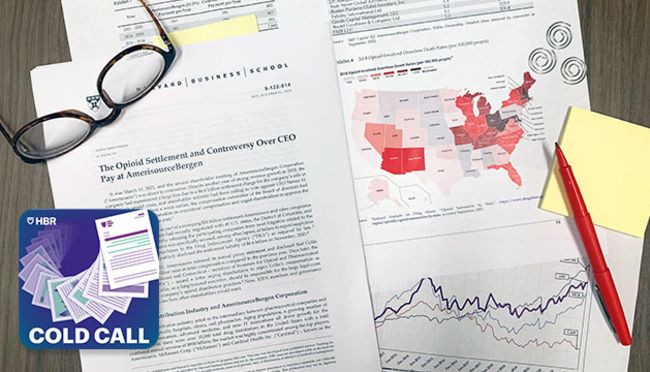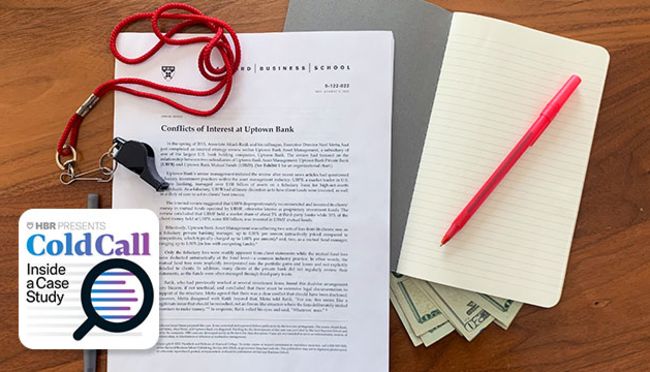
- 06 Jun 2023
- Cold Call Podcast
The Opioid Crisis, CEO Pay, and Shareholder Activism
In 2020, AmerisourceBergen Corporation, a Fortune 50 company in the drug distribution industry, agreed to settle thousands of lawsuits filed nationwide against the company for its opioid distribution practices, which critics alleged had contributed to the opioid crisis in the US. The $6.6 billion global settlement caused a net loss larger than the cumulative net income earned during the tenure of the company’s CEO, which began in 2011. In addition, AmerisourceBergen’s legal and financial troubles were accompanied by shareholder demands aimed at driving corporate governance changes in companies in the opioid supply chain. Determined to hold the company’s leadership accountable, the shareholders launched a campaign in early 2021 to reject the pay packages of executives. Should the board reduce the executives’ pay, as of means of improving accountability? Or does punishing the AmerisourceBergen executives for paying the settlement ignore the larger issue of a business’s responsibility to society? Harvard Business School professor Suraj Srinivasan discusses executive compensation and shareholder activism in the context of the US opioid crisis in his case, “The Opioid Settlement and Controversy Over CEO Pay at AmerisourceBergen.”

- 14 Feb 2023
- Cold Call Podcast
Does It Pay to Be a Whistleblower?
In 2013, soon after the US Securities and Exchange Commission (SEC) had started a massive whistleblowing program with the potential for large monetary rewards, two employees of a US bank’s asset management business debated whether to blow the whistle on their employer after completing an internal review that revealed undisclosed conflicts of interest. The bank’s asset management business disproportionately invested clients’ money in its own mutual funds over funds managed by other banks, letting it collect additional fees—and the bank had not disclosed this conflict of interest to clients. Both employees agreed that failing to disclose the conflict was a problem, but beyond that, they saw the situation very differently. One employee, Neel, perceived the internal review as a good-faith effort by senior management to identify and address the problem. The other, Akash, thought that the entire business model was problematic, even with a disclosure, and believed that the bank may have even broken the law. Should they escalate the issue internally or report their findings to the US Securities and Exchange Commission? Harvard Business School associate professor Jonas Heese discusses the potential risks and rewards of whistleblowing in his case, “Conflicts of Interest at Uptown Bank.”

- 13 May 2022
- Research & Ideas
Company Reviews on Glassdoor: Petty Complaints or Signs of Potential Misconduct?
Online reviews by employees can signal internal factors that raise the risk of scandal. Research by Dennis Campbell, who analyzed reviews of 4,000 companies, offers insights for managers trying to prevent misdeeds long before they happen.

- 10 Dec 2021
- Research & Ideas
Truth Be Told: Unpacking the Risks of Whistleblowing
The stakes are high for employees who report potential malfeasance at their companies. Aiyesha Dey and Jonas Heese discuss how companies benefit from whistleblowers and steps regulators could take to empower them. Open for comment; 0 Comments.

- 08 Oct 2021
- Research & Ideas
How Newspaper Closures Open the Door to Corporate Crime
A study of misbehavior among publicly traded companies illustrates the critical watchdog role that newspapers play, and the problems that arise when publications go out of business. Research by Jonas Heese. Open for comment; 0 Comments.

- 03 Dec 2018
- Research & Ideas
How Companies Can Increase Market Rewards for Sustainability Efforts
There is a connection between public sentiment about a company and how the market rewards its corporate social performance, according to George Serafeim. Is your company undervalued? Open for comment; 0 Comments.
- 03 Jul 2013
- What Do You Think?
What Are the Limits of Transparency?
Summing Up: What's the proper balance in an organization between transparency and opaqueness? Many of Jim Heskett's readers would err on the side of management forthrightness. Closed for comment; 0 Comments.

- 11 Mar 2010
- Working Paper Summaries
The Many Faces of Nonprofit Accountability
Nonprofit leaders face multiple, and sometimes competing, accountability demands: from numerous actors (upward, downward, internal), for varying purposes (financial, governance, performance, mission), and requiring differing levels of organizational response (compliance and strategic). Yet is it feasible, or even desirable, for nonprofit organizations to be accountable to everyone for everything? The challenge for leadership and management is to prioritize among competing accountability demands. This involves deciding both to whom and for what they owe accountability. HBS professor Alnoor Ebrahim provides an overview of the current debates on nonprofit accountability, while also examining the tradeoffs inherent in a range of accountability mechanisms. Key concepts include: Accountability is not simply about compliance with laws or industry standards, but is more deeply connected to organizational purpose and public trust. Nonprofits will continue to face multiple and competing accountability demands, so they must be deliberate in prioritizing among these demands. A critical challenge is to find a balance between upward accountability to their patrons and remaining true to their missions. Few nonprofits have paid serious attention to how they might be more accountable to the communities they seek to serve. Juggling the many expectations of accountability—for finances, governance, performance, and mission—requires integration and alignment throughout the organization. Numerous mechanisms of accountability are available to nonprofits, such as greater transparency and disclosure, performance assessment, industry self-regulation, and adaptive learning. But leaders must adapt any such mechanisms to suit their organization. The greatest payoffs rest with strategy-driven forms of accountability that can help nonprofits to achieve their missions. Closed for comment; 0 Comments.
- 07 Jul 2008
- Research & Ideas
Innovation Corrupted: How Managers Can Avoid Another Enron
The train wreck that was Enron provides key insights for improving corporate governance and financial incentives as well as organizational processes that strengthen ethical discipline, says HBS professor emeritus Malcolm S. Salter. His new book, Innovation Corrupted: The Origins and Legacy of Enron's Collapse, is a deep reflection on the present and future of business. Key concepts include: Enron's stated purpose was too general to permit disciplined and responsible decision-making in the face of difficulty. The lessons of Enron relate to strengthening board oversight, avoiding perverse financial incentives for executives, and instilling ethical discipline throughout business organizations. Directors of public companies can adapt key aspects of the private-equity governance model to ensure that they fulfill their oversight responsibilities. Incentive systems should reward accomplishments other than economic performance, and penalize failures. Companies can take steps to help senior executives avoid the two sources of leadership failure at Enron: personal opportunism and flights to utopianism. Closed for comment; 0 Comments.

Amazon in Seattle: The Role of Business in Causing and Solving a Housing Crisis
In 2020, Amazon partnered with a nonprofit called Mary’s Place and used some of its own resources to build a shelter for women and families experiencing homelessness on its campus in Seattle. Yet critics argued that Amazon’s apparent charity was misplaced and that the company was actually making the problem worse. Paul Healy and Debora Spar explore the role business plays in addressing unhoused communities in the case “Hitting Home: Amazon and Mary’s Place.”